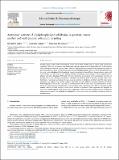Por favor, use este identificador para citar o enlazar a este item:
http://hdl.handle.net/10261/335661COMPARTIR / EXPORTAR:
 SHARE SHARE
 CORE
BASE CORE
BASE
|
|
| Visualizar otros formatos: MARC | Dublin Core | RDF | ORE | MODS | METS | DIDL | DATACITE | |

| Título: | Antitumor activity of alkylphospholipid edelfosine in prostate cancer models and endoplasmic reticulum targeting |
Autor: | Dakir, El Habib; Gajate, Consuelo CSIC ORCID ; Mollinedo, Faustino CSIC ORCID | Palabras clave: | Edelfosine Alkylphospholipid analog MPAKT transgenic animal model Xenograft animal model Endoplasmic reticulum Prostate cancer |
Fecha de publicación: | nov-2023 | Editor: | Elsevier | Citación: | Biomedicine and Pharmacotherapy 167: 115436 (2023) | Resumen: | Prostate cancer is the second most frequent cancer and the fifth leading cause of cancer death among men worldwide. While the five-year survival in local and regional prostate cancer is higher than 99%, it falls to about 28% in advanced metastatic prostate cancer. The ether lipid edelfosine is considered the prototype of a family of promising antitumor drugs collectively named as alkylphospholipid analogs. Here, we found that edelfosine was the most potent alkylphospholipid analog in inducing apoptosis in three different human prostate cancer cell lines (LNCaP, PC3, and DU145) with distinct androgen dependency, and differing in tumor suppressor phosphatase and tensin homolog (PTEN) and p53 status. Edelfosine accumulated in the endoplasmic reticulum of prostate cancer cells, leading to endoplasmic reticulum stress and cell death in the three prostate cancer cells. Inhibition of autophagy potentiated the pro-apoptotic activity of edelfosine in LNCaP and PC3 cells, where autophagy was induced as a survival response. Edelfosine induced a slight and transient inhibition of AKT in PTEN-negative LNCaP and PC3 cells, but not in PTEN-positive DU145 cells. Daily oral administration of edelfosine in murine prostate restricted AKT kinase transgenic mice, expressing active AKT in a prostate-specific manner, and in a DU145 xenograft mouse model resulted in significant tumor regression and apoptosis in tumor cells. Taken together, these results show a significant in vitro and in vivo antitumor activity of edelfosine against prostate cancer, and highlight the endoplasmic reticulum as a novel and promising therapeutic target in prostate cancer. | Descripción: | 11 p.-5 fig. | Versión del editor: | https://doi.org/10.1016/j.biopha.2023.115436 | URI: | http://hdl.handle.net/10261/335661 | DOI: | 10.1016/j.biopha.2023.115436 | ISSN: | 0753-3322 |
| Aparece en las colecciones: | (CIB) Artículos |
Ficheros en este ítem:
| Fichero | Descripción | Tamaño | Formato | |
|---|---|---|---|---|
| Biomedicine and Pharmacoptherapy_Dakir_2023.pdf | Artículo principal | 4,93 MB | Adobe PDF |  Visualizar/Abrir |
CORE Recommender
SCOPUSTM
Citations
2
checked on 12-may-2024
WEB OF SCIENCETM
Citations
1
checked on 25-feb-2024
Page view(s)
33
checked on 12-may-2024
Download(s)
24
checked on 12-may-2024
Google ScholarTM
Check
Altmetric
Altmetric
Este item está licenciado bajo una Licencia Creative Commons

